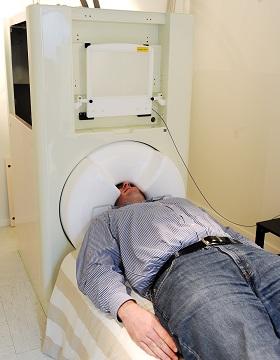Using AI to control energy for indoor agriculture
30 September 2024
Published online 20 June 2012

New York University Abu Dhabi opened last month its Neuroscience of Language Laboratory, which houses a magnetoencephalography (MEG) machine to study how the human brain processes languages.
The MEG machine, custom-built by the Kanazawa Institute of Technology in Japan, is a sensitive, non-invasive scanner that can detect magnetic fluctuations in the brain. It's 200 sensors contained in a large case, not unlike an oversized salon-style hair dryer, are able to pinpoint neural activity. It is the first of its kind in the Gulf region.
"We may be the only lab in the world that will combine simultaneous measurements of MEG, EGG, eye movements [using an eye-tracker], and head movement [using a system that monitors head position every second], while making the MEG signal available in real time," says Alec Marantz, the lab director.
According to Colin Phillips, a linguist at the University of Maryland and a director of a centre that specializes in MEG technology, the lab's location makes it special. "MEG measures extremely small magnetic fields generated by neural activity, and so the amount of other electromagnetic noise in the environment of the lab makes a huge difference. The NYU Abu Dhabi lab is in an extremely quiet environment, so it's able to make more sensitive brain recordings than are possible in other labs around the world."
The lab's scientists have already begun studies on Arabic with its different spoken and written dialects and its unique structure. According to Marantz, initial findings show that, despite Arabic's characteristic syntax, the brain interprets it in a similar manner to other languages.
"We want to understand how the brain makes human language possible in general, and individual languages simply provide useful windows on that general human capacity," says Phillips. "Arabic will undoubtedly add insights to our understanding of brain mechanisms for language more generally."
This insight into how the brain processes languages should help researchers figure out what goes wrong in the brains of people who have difficulty with language, in cases of people that have impaired language abilities and those who have lost the ability to speak following trauma or disease.
The lab has partnered with the Linguistics' Neuroscience of Language Laboratory at the United Arab Emirates University in Al Ain to share resources and expertise and collaborate on research projects. They're also keen to work with researchers in the region who work on languages other than Arabic.
doi:10.1038/nmiddleeast.2012.88
Stay connected: